- Home
- Jim Eldridge
Murder at the Ritz Page 21
Murder at the Ritz Read online
Page 21
‘Morning, guv,’ said Lampson. ‘Did you hear about Oxford Street?’
‘I was there,’ said Coburg. ‘We got caught up in it?’
‘“We”?’
‘I was with my friend Rosa and her housemate Donna. Sadly, Donna was killed.’
‘Killed?’
Coburg nodded. ‘Rosa and I were there when it happened. Flying glass took her head off.’
‘My God! You weren’t harmed?’
‘Blown over but physically untouched. The same with Rosa, but the sight of her friend being killed that way …’ He gave a rueful shrug. ‘It’s going to be hard for her to get over. So she’s staying with me for the moment. I’m telling you in case you should phone me at home and she answers, or you get a phone call from her with a message for me.’
‘No problem,’ said Lampson. ‘Poor girl. I know there’s lots being killed, but when it happens to someone you know, and right in front of your eyes …’ He looked at Coburg quizzically. ‘D’you reckon this marks a change in Hitler’s tactics? So far the centre of London has been untouched. Is this the start of their next wave? Bomb London?’
‘Who’s to say?’ said Coburg. ‘I don’t think even the Nazi High Command know what Hitler’s next move is.’ He picked up the phone and dialled the Ritz’s reception desk. ‘Anyway, I know what my next move is going to be.’ When George answered, Coburg said: ‘George, it’s DCI Coburg. Is Count Ahmed back in residence?’
‘Yes, Mr Coburg, he is. He’s in his suite now. Do you want me to put you through to him?’
‘No thank you, George. I’ll be along to see him personally. If it looks like he’s about to leave, could you tell him that I’m on my way and look forward to seeing him?’
‘And if he should go before you get here?’
‘I’ll arrange for a uniformed officer to be on guard at the door of the Ritz to prevent him leaving,’ said Coburg. He hung up. ‘Right, now to finally nail the elusive Count Ahmed. What about you, Ted?’
‘I’m off to Waterloo. Sergeant Moss is going to go through some of the cases where McGuinness’s people were alleged to be involved, but nothing ever came to court. I’m hoping there might be someone who leaps out as wanting vengeance on Big Mel.’
‘Good luck with that,’ said Coburg. ‘We’ll meet up here at the end of the day and swap notes. The sooner we can lay both cases to rest, the better.’
Thirty minutes later, Coburg was sitting in an armchair in Count Ahmed’s suite, facing the Count who sat on a sofa. This time, unlike Coburg’s meeting with King Zog, there were no bodyguards in attendance. The Count was a small, slightly plump man, in his early fifties, dressed impeccably in a formal suit, a high starched collar on his shirt which sported a grey and blue tie with a large Windsor knot.
‘Thank you very much for seeing me, Count Ahmed,’ said Coburg.
‘Did I have a choice?’ asked Ahmed, regarding Coburg with unfriendly eyes. ‘I was informed that there was an armed police officer at the entrance to the hotel to prevent me from leaving.’
‘Not armed,’ corrected Coburg with a polite smile. ‘And he was only there to request you stay until I arrived, if that was acceptable to you.’
‘And if it was unacceptable?’ demanded Ahmed.
‘Then I can only apologise if there was a misunderstanding,’ said Coburg. ‘Certainly, no offence or disrespect was intended. I wanted to meet you after His Majesty asked me to investigate, because he was keen to find out the identity of the dead man.’
‘Yes, so I understand,’ said Ahmed. ‘Have you?’
‘We have. His name was Joe Williams, although he performed under the name of Antonio.’
‘Antonio?’
‘He was a tango dancer.’
The Count was silent, taking this in. Then he asked: ‘What was his nationality?’
‘He was English, as far as we know. Although it seems that not everything is as it appears. For example, the man who was found dead in this hotel’s kitchen the other day. You may have heard about it?’
‘I have been away, so I’m not up to date with recent events,’ said Ahmed.
‘He was a kitchen hand and he’d been stabbed to death, his body hidden behind shelves in one of the storerooms. According to his papers he was Swiss, but we now believe he may have been from Macedonia.’
‘What makes you think that?’
‘Evidence we found in his lodgings.’ He watched Ahmed closely as he added: ‘And we understand Macedonia is closely linked to Albania.’
‘What are you suggesting?’ demanded the Count angrily.
‘Nothing,’ said Coburg. ‘But I did wonder if any of your retinue may have known this man?’
The Count’s expression grew even angrier. ‘That is a slander!’ he snapped.
‘No slander intended,’ said Coburg. ‘Just a question.’
Count Ahmed glared at him. ‘No one in the King’s “retinue” – as you call it – would have had any association with this …’ He paused, then said with a sneer: ‘… kitchen worker.’ He looked at Coburg with unconcealed anger as he added: ‘I think it best if you end your investigation.’
‘But the King asked me—’ began Coburg.
‘His Majesty has changed his mind,’ interrupted Ahmed abruptly. ‘The dead man is no longer our concern.’
‘But it is our concern,’ said Coburg.
‘The King’s apartments are Albanian territory while His Majesty is in residence,’ snapped Ahmed. ‘You have no jurisdiction here.’
‘On the contrary,’ replied Coburg calmly, ‘the man who died was a British citizen. The Ritz Hotel is on British soil. And we are at war, which means there are security implications.’
‘What security implications?’ demanded Ahmed.
‘We’ve received information that the British Union of Fascists may be somehow involved.’
Ahmed frowned. ‘I do not understand what you mean.’
‘You’re aware of the British Union of Fascists, I assume?’ said Coburg.
‘No,’ responded Ahmed. ‘I have never heard of them.’
‘They are an association of people in this country who support Adolf Hitler and Benito Mussolini. Their leader is – or, rather, was – Sir Oswald Mosley. Currently he’s been interned in prison, along with many of his followers. Interestingly, the BUF has many powerful figures among its members, including quite a few from the British aristocracy. Not all of them are in prison, but I believe they are kept under surveillance. For example, there’s a certain lord with a castle in north Kent. Were you in north Kent lately, by any chance?’
Ahmed got to his feet. ‘I have nothing more to say, Inspector,’ he said stiffly.
Coburg nodded and rose. ‘Thank you, Count Ahmed. I’m sure we will be in touch again. Please give my regards to His Majesty.’
This time, as Coburg left the suite, he noticed that, unlike at his arrival when there had been no reception committee for him, now two bodyguards had appeared at the door and were standing to attention. The two men, both sporting large moustaches, looked at Coburg with obvious distrust and suspicion as he appeared. Coburg nodded politely to them.
‘Good morning, gentlemen,’ he said.
They didn’t respond. Possibly I should have learnt how to say it in Albanian, he thought as he made for the lift.
Lampson sat in Sergeant Moss’s office at Waterloo police station as the man sorted through files of old cases.
‘The trouble is most of the cases involving Thackeray and McGuinness are hearsay; there’s not much paperwork on them because they never came to court,’ he said.
‘Like that one you told us about: the warehouse and the sugar robbery?’
‘That’s just one. I can think of others.’
‘Any of them where someone was seriously hurt. Maybe killed?’
‘There was one where a van driver was killed. His van was hijacked and he ran after it, grabbing the handle of the driver’s door to try to pull it open, and the bloke at the wheel ran
him into a lamp post to knock him off. Fractured his skull. He died two days later.’
‘Who was the driver? Thackeray?’
‘We never found out,’ said Moss. ‘The only witness statement we had was from someone who saw the van going along with the bloke hanging onto the driver’s door handle, and it hitting the lamp post and him falling off into the road. Then the van roared off. We found it burnt out the next day on waste ground in Lambeth.’
‘McGuinness’s territory.’
‘Exactly.’
‘Well, that’s a possibility. Who did the van belong to? And who was the driver who was killed?’
‘Here it is,’ said Moss, and he opened a paper file. ‘Alf Watson was the van driver. He left a widow.’ Moss wrote down an address on a sheet of paper. ‘The van was owned by a big delivery firm. They got paid by the insurance company.’ He picked up another file. ‘Then there was this one: a tobacconist. He was in his shop when it got robbed by some masked men. He had a heart attack and died during it. The word on the street was that Billy Thackeray was in the frame, but we had no luck in getting evidence.’ Again, he wrote down an address. ‘This is the address of the shop. His widow, Mrs Porter, still runs it, along with her teenage son.’
Moss passed the paper to Lampson.
‘What about the sugar robbery you were talking about? The warehouse?’
‘No one was killed or even injured during it,’ said Moss. Then he gave a sad sigh. ‘But, by all accounts, it was the last straw for Mike Bassett, the bloke who owns the warehouse. I don’t know the whole story, but I think he’s had a lot to cope with lately.’
‘In what way?’
‘Like I say, I don’t know the details, but the copper who does his beat said he’s had a lot of trouble recently.’
‘I’ll go and see him, have a word,’ said Lampson. ‘You never know. Have you got his address?’
Moss took the sheet of paper back from Lampson, then began to go through the files in search of Bassett’s details. As he did, he said: ‘By the way, did you hear about the dreadful bombing yesterday?’
‘Did I ever!’ said Lampson. ‘My guv’nor and his girlfriend were caught in it.’
‘What were they doing in Ramsgate?’ asked Moss.
Lampson looked at him, puzzled. ‘No, they were in Oxford Street. What happened in Ramsgate?’
‘It got flattened. As well as the people killed by the bombing, some bastard in a Messerschmidt even machine-gunned civilians in the main street.’
‘Do they know who was killed?’ asked Lampson, suddenly anxious. ‘I’ve got relatives in Ramsgate. An aunt and an uncle.’
Moss picked up the phone. ‘I’ll give a bloke I know a ring. He’s a sergeant at Ramsgate nick. What’s their name?’
‘Brewer,’ said Lampson. ‘George and Ada Brewer. They’re both in their sixties. They live near Camden Square.’
Moss asked the operator to put a call through to Ramsgate police station, then cradled the receiver in his shoulder while he carried on looking through the files.
‘Here it is,’ he said. ‘Mike Bassett.’ He added Bassett’s details to the sheet and handed it back. Lampson heard the telephone operator’s voice saying something, then Moss said: ‘Thanks anyway’, before hanging up.
‘She said there’s a problem on the phone line to Ramsgate police station,’ he told Lampson. ‘If the bombing was as bad as I hear, I’m not surprised. I hope your uncle and aunt are all right.’
CHAPTER THIRTY-ONE
Having been stonewalled by Count Ahmed, Coburg decided to try a different tack. The connection between Ahmed and Lord Mainwaring intrigued him. What was the link between a member of Albania’s royal court, known to have escaped from Mussolini’s invading fascist army, and a British aristocrat, a member of the British Union of Fascists? His curiosity took him back to MI5’s offices at Wormwood Scrubs and Inspector Hibbert.
‘Why wasn’t Lord Mainwaring interned with the rest of the BUF?’ asked Coburg.
‘Lord Mainwaring was not seen as a danger to national security because his support was towards Italy rather than Hitler’s Germany,’ replied Hibbert.
‘Mussolini’s still our enemy.’
‘Yes, but we got the idea that it wasn’t so much politics as art.’
‘Art?’
‘He’s a collector of Italian paintings. Classical art, that is, not modern. He spent quite a bit of time in Italy before the war. His family have got an estate there, as well as the estate in Kent.’
‘So, he’s wealthy, then?’
‘Oh yes.’
‘Where’s his estate in Italy?’
Hibbert checked the files. ‘Just outside Brindisi,’ he said.
‘As I recall that’s on the coast on what they term the Heel of Italy.’
‘That’s right.’
‘Just across the strait of Otranto from Albania.’
‘Right again,’ said Hibbert, impressed. ‘You know your geography.’
‘Only some. When my brothers and I were boys we had an aunt who used to take us to Italy to improve us, and one time she took us to Taranto and the local area.’
‘We had an aunt who lived in Southend and was an usherette at the local cinema, and when we went there on holiday she used to sneak us into the pictures for nothing,’ said Hibbert with a slightly rueful air.
‘The principle’s the same,’ said Coburg. ‘And it’s all culture. Personally, I think you had the better part of it. Laurel and Hardy beat Canaletto and that crowd every time, in my book.’
‘You think this Lord Mainwaring is connected with the dead man at the Ritz?’
‘Two dead men,’ Coburg reminded him. ‘The kitchen hand was apparently from Macedonia, which borders Albania. And Count Ahmed, King Zog’s private secretary, has been a guest of Lord Mainwaring. What does that suggest?’
‘But why would King Zog have anything to do with someone who’s a supporter of the Italian fascists, when we were told he and his family fled Albania to escape from Mussolini’s troops?’ asked Hibbert.
‘I don’t know,’ admitted Coburg. ‘But maybe everything isn’t as it appears to be.’
Mrs Watson, the widow of the van driver, lived in a small terraced house with an abundance of young and very noisy children, as far as Lampson could tell from the shouting coming from inside the house. She stood on the doorstep and examined Lampson’s warrant card before handing it back to him.
‘I won’t invite you in,’ she said. ‘The place is a madhouse. The kids used to be quiet as mice when Alf was alive cos they knew what they’d get if they were rowdy. The back of his hand if they were lucky and the toe of his boot if they weren’t. Since he’s been gone they run riot.’ She cast a tired look into the house. ‘I can’t control them. They won’t listen to me. They saw me too often getting a whack from Alf, so they ain’t scared of me. And fear’s the only thing that keeps ’em in check.’
‘You must’ve felt angry when you heard that Alf was dead,’ said Lampson. ‘Especially the way it happened, him getting killed when his van was stolen.’
‘Angry?’ she looked at him in disbelief. ‘I saw it as my salvation. No more getting battered by him. The only trouble was the kids started playing up, but at least they don’t hit me.’
‘Was there anyone who might have been angry at him being killed that way?’ asked Lampson.
‘Are you kidding?’ she scoffed. ‘I’m surprised they didn’t put out banners round here when they heard. Alf was a nasty bastard, too free with his fists and boots. No one liked him. Good riddance, that’s what I say.’
It was at the sixth telephone number on the list Coburg had left her, the St John Ambulance Service, that Rosa got the answer she’d been seeking. After introducing herself as speaking on behalf of Detective Chief Inspector Coburg from Scotland Yard, she asked if they had collected the dead body of a young woman from the site of the bombing in Oxford Street the previous night. ‘Her name was Donna Dunn, and DCI Coburg is keen to ascertain the whereabo
uts of her body because it affects a case he is currently working on.’
‘We collected quite a few casualties from that bombing last night,’ said the man. ‘However we weren’t able to make a proper identification of most of them. If there were bags near a particular body they would have accompanied that body, and I’m sure they will have identification inside them, ration books or the like.’
Rosa hesitated, then, forcing herself to keep any traces of emotion out of her voice, she said: ‘This particular body would be noticeable because it had been decapitated by flying glass.’
‘Ah, yes,’ he said. ‘The driver remarked on that one when he returned to base. A tragedy. Let me see, I’ll just check where she was taken.’ There was a pause and the sound of papers being flicked through, then he was back on the line again. ‘She was taken to the mortuary at Paddington hospital.’
‘Thank you,’ said Rosa. Again, steeling herself against betraying her non-officialdom by letting emotion creep into her voice, she asked: ‘Was all of her taken?’
‘Excuse me?’ the man asked, puzzled.
‘Her head,’ said Rosa flatly.
‘Oh yes,’ replied the man. ‘Both head and body were taken there.’
‘Thank you,’ said Rosa.
With that, she put the phone down and wept.
Coburg’s next port of call was to Sir Vincent Blessington at the Foreign Office.
‘What can you tell me about King Zog’s relationship with Italy?’ he asked.
‘The fact that he and his family fled just before the Italians invaded should give you a clue,’ said Blessington.
‘But before that. Weren’t the Albanians and Mussolini allies?’
‘Yes, they were, and very close. In fact, it was thanks to Italy’s support that Zog was able to gain control of Albania. And then, during the economic depression of the early 1930s, Zog became so dependent on Mussolini that the Albanian National Bank was based in Rome. Unfortunately for Zog, the Albanian economy, which was always on a knife edge, virtually collapsed not long after and Albania was unable to pay the interest on the money it had borrowed from Italy to keep it afloat. The result was that Italy began to exert its dominance by taking control of the police force, as well as its major industries. The final straw for Zog was when Mussolini ordered that Italian be taught in all Albanian schools as the country’s first language. Zog refused and tried to build alliances with other countries, notably France and Germany, but those attempts failed, and so Albania was forced back under the influence of Mussolini.’

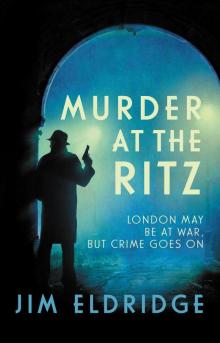 Murder at the Ritz
Murder at the Ritz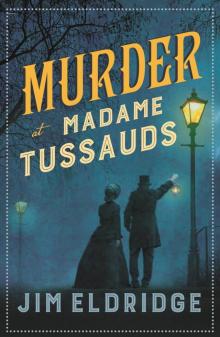 Murder at Madame Tussauds
Murder at Madame Tussauds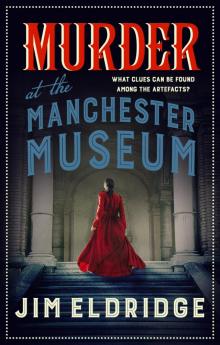 Murder at the Manchester Museum
Murder at the Manchester Museum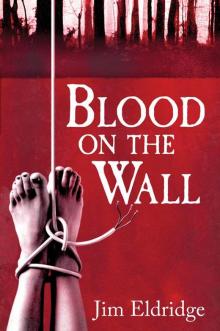 Blood On the Wall
Blood On the Wall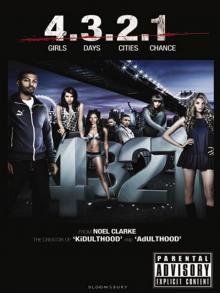 4.3.2.1
4.3.2.1 Jungle Kill (Black Ops)
Jungle Kill (Black Ops)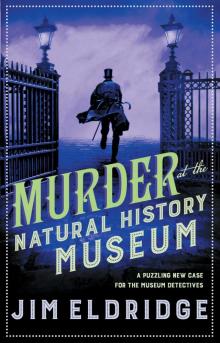 Murder at the Natural History Museum
Murder at the Natural History Museum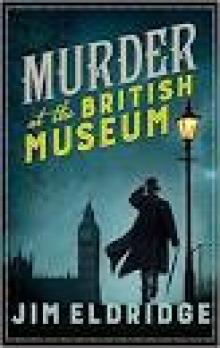 Murder at the British Museum
Murder at the British Museum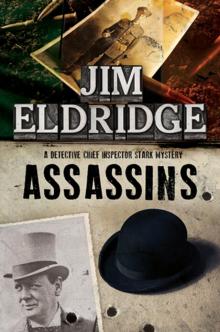 Assassins
Assassins Hunk and Thud
Hunk and Thud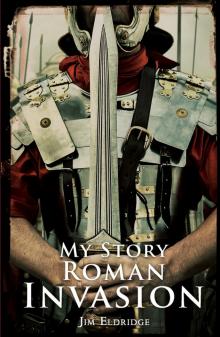 Roman Invasion
Roman Invasion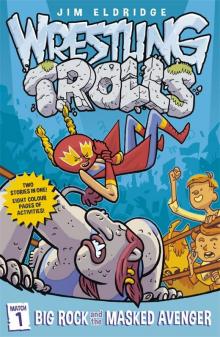 Big Rock and the Masked Avenger
Big Rock and the Masked Avenger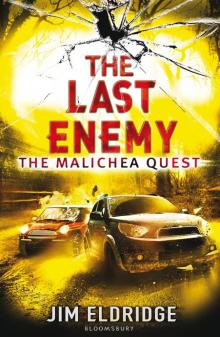 The Last Enemy
The Last Enemy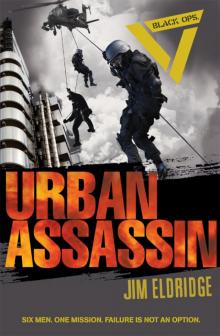 Urban Assassin
Urban Assassin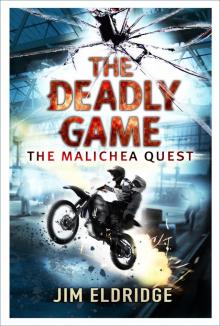 The Deadly Game
The Deadly Game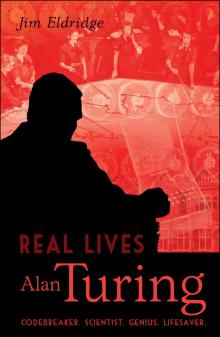 Alan Turing
Alan Turing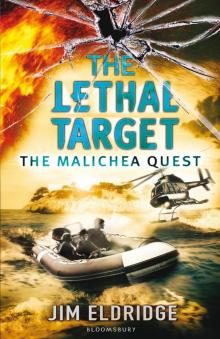 The Lethal Target
The Lethal Target The Giant Rumble
The Giant Rumble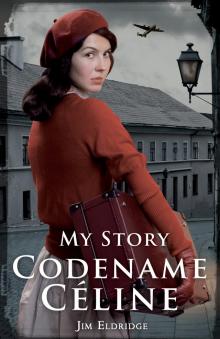 Codename Céline
Codename Céline Death in the Desert
Death in the Desert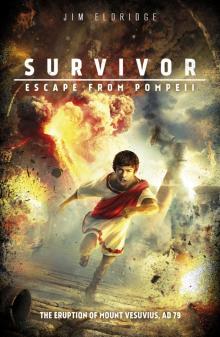 Escape from Pompeii
Escape from Pompeii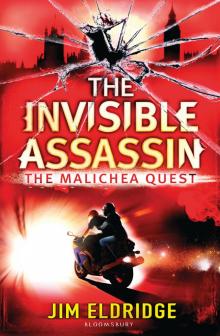 The Invisible Assassin
The Invisible Assassin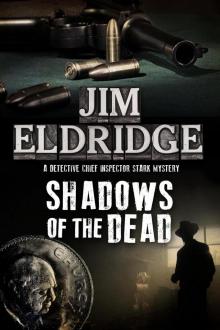 Shadows of the Dead
Shadows of the Dead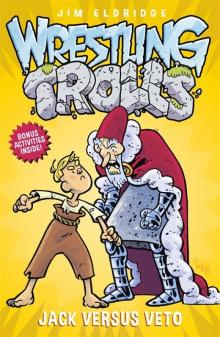 Jack Versus Veto
Jack Versus Veto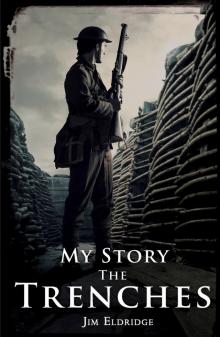 The Trenches
The Trenches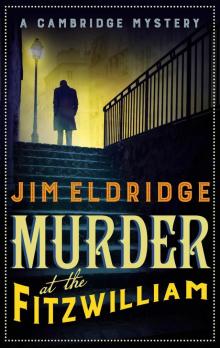 Murder at the Fitzwilliam
Murder at the Fitzwilliam Coming Home
Coming Home